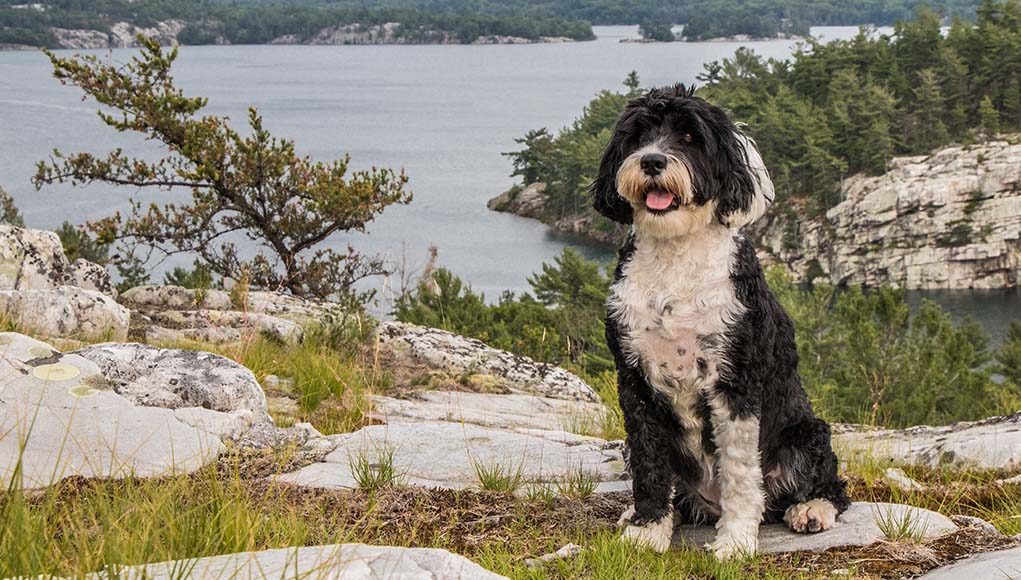Table of Contents
Residing on the warm coast of Portugal, the Portuguese Water Dog Breed helped fishermen in their labor day to night.
These loyal, mighty, and diligent creatures became second in command with herding fishing nets and compiling fishing equipment.
The Portuguese Water Dog became next in line savants of the sea.
Although since modern times, machines have been used instead of them in fishing. They are still the best in supporting water rescues.
Portuguese Water Dog History and Overview
In their native land, they are known to be fisher man’s right hand. That’s why they were named the Portuguese Fishing Dog. Besides fishermen, they were able to herd fish in the nets.
Their breed is said to be around since 200 B.C. The Moors brought this breed during their invasion of the Iberian Peninsula.
Another mentions their traces from 700 B.C, wherein they help with farm duties.
They belong to the utility category. Portuguese Water Dogs excel in herding, hunting, and of course, water-affiliated activities.
What are Portuguese Water Dog puppies like? Let’s take a look at some features to get you started.
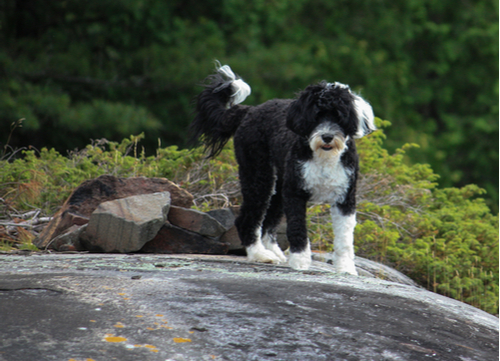
Physical Characteristics of Portuguese Water Dogs
Portuguese Water Dogs have a fit but robust body structure.
These dogs' ideal height is 19 inches but Male Portuguese Water Dogs can be tall at 20 to 23 inches and weigh from 42 to 60 pounds.
Female Portuguese Water Dogs can stand at 17 inches to 21 inches and can weigh from 35 to 50 pounds.
Portuguese Water Dogs' heads are typically big. Their eye color is usually black, dark brown, or light shades of brown. Their eyes are rounded, slightly slanted, and well set apart.
Portuguese Water Dogs' noses are wide and usually solid in color but may have pigments of markings as well.
Their mouth-front lip is hefty. These pups' teeth are well developed.
Their muzzle is wide, from their nose to their mouth. It has a faint slant appearance.
Portuguese Water Dogs' muzzle is also quite big and long. It gives them a sleek look despite their long curly hair.
Their neck is straight, round, and muscly that connects well with their upper body.
Portuguese Water Dogs have a broad and long upper body, then an elongated slant below towards their hind legs. Their tail is also quite long.
Portuguese Water Dogs' coats can come in Black, Brown, and White. The Black coated Portuguese Water Dogs are more common. Some Water Portuguese Dogs may have white markings as well.
The Portuguese Water Dog's coat is curly. It may have some loose curls and some may have tight curls. Their coat is very dense so it should be groomed regularly.
Their webbed feet feature is what makes them best in the water scene.
Temperament
Portuguese Water Dogs are extraordinarily affectionate towards their owner. Usually, they are devoted to their owner, but they do accept their family.
They are likely to show how happy they are upon seeing their families or owners.
Portuguese Water Dogs are also amazing with children. It’s still best to have them supervised together.
The excitement for both parties may become too much when they meet.
Portuguese Water Dogs are usually cautious with strangers but they are very welcoming if they’re introduced properly.
Portuguese Water Dogs are good with other dogs but they may still need supervision, especially with unfamiliar dogs around them. Like other dogs, it’s best to socialize them when they’re young.
Portuguese Mountain Dogs are incredibly adaptable. They do well with apartment living but it’s best not to leave them alone.
Portuguese Water Dogs don’t do well alone. If you’re planning to leave for a while, it's best to have them sit with someone they also know.
They are fine with new owners. But you also have to make sure that the new fur parents are up to the challenge for this quick-witted fur ball.
Portuguese Water Dogs are amazing companions and they are amazing to be with.
Portuguese Water Dogs do well both in cold and warm seasons. Since their coat is single-coated, they will need protection in colder seasons, so it's better that they stay indoors unless out for exercise.
They bark comparatively.
Portuguese Water Dogs are a very energetic and playful breed. They are very demanding of attention from their owners and thrive on their companionship.
It’s best not to leave them at home alone for they can be destructive when anxious.
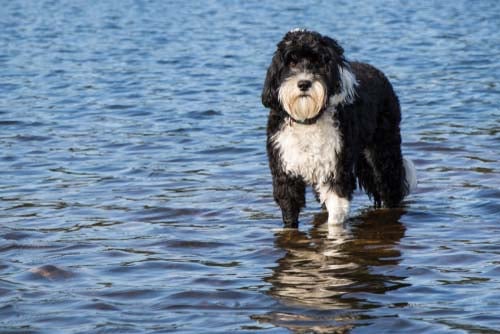
Training
These fisher dogs may work closely and side-by-side with us humans but they’ve acquired some wits with them over the years.
Portuguese Mountain Dogs are remarkably trainable. They are quick-witted and dauntless.
Portuguese Water Dogs are quick on the uptake so they may get stubborn when trained. If they see that their owner’s leadership is inadequate, they will react persistently.
They are best with owners who have experience in leadership. But if you like to battle with their wits, get ready for some occasional push and pull.
Portuguese Water Dogs are motivated by their owner’s attention. Owners can use this as a way to make training both communicative and entertaining. They are very eager to please their owners too.
Portuguese Water Dogs react to positive reinforcement and praise well.
It’s best to use this method when training them at first but make sure to be stern when needed. Dogs need to understand the things they need to do, they can do or can not do.
Basic training is a must. Portuguese Water Dogs tend to be destructive if they aren’t socialized and trained at a young age.
They should at least have some obedience training started and continued after.
Training them physically and mentally can help shape their behavior into more composed utility dogs.
They may have the energy of a sea dolphin but no worries, exercise can help release this extra energy.
Exercise
Since their energy level is fairly high, owners can extend their daily regimen from exercise, training, and playtime.
Portuguese Water Dogs require dynamic daily exercise. They can go for long walks or play in a spacious area.
Walks or run should be done for more than half an hour daily. Along with exercises, playtime with them can also do a lot in loosening up their energy.
Portuguese Water Dogs can also exercise with mentally vitalizing activities like food puzzles, hide and seek, and learning tricks.
Portuguese Water Dogs are very athletic. They can exercise and enjoy athletic sports such as swimming, and agility exercises like jumping through hoops.
There are a lot of activities owners can do with their Portuguese Water Dogs as exercise.
They can even enjoy workouts with you. You may also opt for jogging or some sports you can both do is exciting for them too.
Talk about playing, exercising, and bonding with their owner, wouldn’t that be exciting?
Portuguese Water Dogs tend to be destructive when idle. Having an undeniable amount of energy, they’ll get bored easily if their requirements are not met.
The same goes when you get them ready for an unfamiliar house. You might be even met with bursting energy when you get home after not being able to loosen them up.
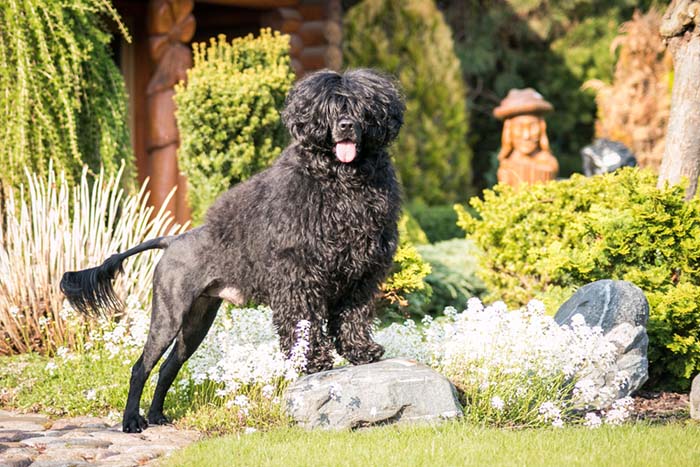
Health Care
Portuguese Water Dogs are a relatively healthy breed. They can live from 10 to 14 years.
They are a healthy breed if procured from a reputable breeder or shelter. But it’s best to have the Portuguese Water Dog checked and tested after adoption.
Sadly, due to irresponsible and illegal breeding, some Portuguese Water Dogs have suffered diseases due to this improper handling.
Advocates, professionals, and owners' role to play is to help discontinue this suffering as soon as possible.
Have the Portuguese Water check for:
- GM-1 DNA Test
- Hip Evaluation
- JDCM DNA Test
- PRA Optigen DNA Test
GM-1 DNA Test
GM-1 DNA Test is done on Huskies, Portuguese Water Dog, and Shiba Inus to determine whether they are carriers of the Gangliosidosis disease.
This is to see if there is a deficiency of enzyme functions which can lead to abnormal storage of gangliosides. This disease is can cause a malfunction in the nervous system.
If the test is done, the results will be able to determine if the dog is clear, a carrier, or affected.
It’s important to have your Portuguese Water Dog checked right when adopted. Some dogs who are affected can be at risk of fatality for as short as 8 months.
Hip Dysplasia
Hip dysplasia is a genetic condition wherein the socket of the joint and ball becomes distorted. Portuguese Water Dog stature and mass stress their lower body areas, especially in their joints.
When diagnosed with hip dysplasia, it’s important to keep their weight in the normal range and have them exercise with activities that promote joint therapy.
Veterinarians may prescribe medications for anti-inflammatory/ pain relievers and supplements.
Juvenile Dilated Cardiomyopathy
Juvenile Dilated Cardiomyopathy is the enlargement of the cardiac chamber and decline in function. At least two weeks of age to six months can the disease begin.
Dogs who have been diagnosed may pass as early as 10 weeks and late as 1 year of age.
Prevention is unlikely if inherited. It can depend on prognosis and response to treatment as well.
It’s best to have the Portuguese Water Dog tested before it’s too late. Improvement is viable if treated early and properly.
Progressive Retinal Atrophy
Progressive Retinal Atrophy is a degenerative disease that affects the rod and cone cells in the eyes that leading to blindness.
It is an inherited disease and it’s known to have no treatment. It can progress quickly from a year or two.
This test can help determine if the Portuguese Water Dog is carrying this gene. You can help discontinue the defective gene by avoiding breeding the dog.
Hence, it’s always best to know the dog’s condition before breeding.
Have your Portuguese Water Dog checked regularly to guarantee less risk to their health.
If adopted from a reputable breeder, the Portuguese Water will less likely have any health disorders.
If the owner ever plans to adopt from somewhere else, we highly recommend having it checked and tested with the veterinarian as soon as possible.
This is to see if the Portuguese Water Dog is fit to breed as well. As responsible owners and animal advocates, we should ensure that dogs’ future litters are healthy and happy.
This will help us reduce the risk of obtaining genetically inherited diseases from their past as well.
Other than that, it’s best to meet the requirements for Portuguese Water Dogs. It’s a big help to keep their health intact and, of course, them happy.
Even if they are physically healthy, it’s best to get them their regular check-up to see if there are any changes or improvements needed.
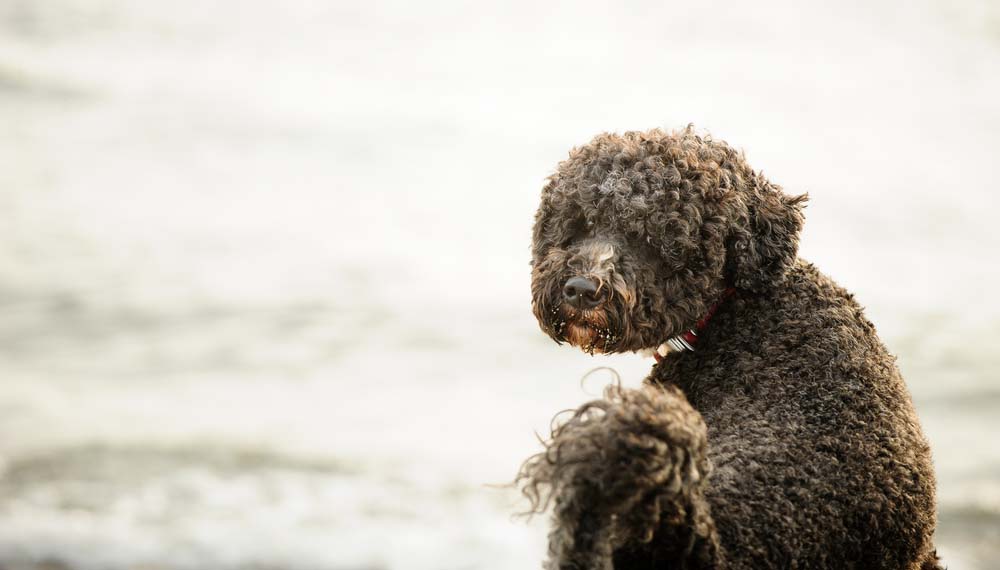
Diet of Portuguese Water Dogs
Portuguese Water Dogs require healthy balanced food. Owners can prepare high-quality dog food or homemade dog food.
You can research or inquire with the veterinarian what food is best and best not given to them.
Although they are medium in size, their energy is similar to a large one.
At least 3 to 4 cups of food distributed twice or thrice a day is sufficient for them. Owners can also provide wet food to promote hydration.
Mixing it in their dry food can add a different flavor from their usual everyday meal. Of course, fresh water is a must. Treats are to be given fairly but not too much.
Owners should be careful with what food they give to Portuguese Water Dogs since they are prone to gaining weight.
It’s best to get the food after 30 minutes of feeding. Like all dogs, make sure not to leave food with them when unfinished.
A strict feeding schedule is a must for these dogs as a part of training as well.
Grooming
Portuguese Water Dogs may require some effort in terms of grooming them, but it’s almost the same for owners. It’s important to have their grooming in check as well.
Portuguese Water Dog’s coats are famous for being hypoallergenic regardless of their thickness and every so often shedding. It’s important to groom it regularly.
Portuguese Water Dog’s hair should be clipped frequently to keep its quality at its best.
If their hair is kept long and not groomed per se, their skin and coat health may be compromised. It can be clipped with a lion clip or retriever clip cut.
Portuguese Water Dog should also be bathed but occasionally. Especially after bathing outside, rinsing the Portuguese Water Dog with fresh clean water is important.
Brush their hair with the right brushing tools to avoid matting and painful stroking. A slicker brush or other flexible bristled brush is good for matting hair.
Portuguese Water Dogs should be nailed trimmed at least once every two weeks. If owners notice that their nails aren’t long, it’s sufficient to shave the tips instead.
Portuguese Water Dogs may have a habit of jumping to their owners as a greeting so it’s best to keep their nails short for these instances.
It’s important to check their ears regularly for signs of infection. It’s also best to clean it as needed as they are prone to ear infections. When they’re always in the water, leftover moisture compiling may lead to infection.
Portuguese Water Dogs should have their teeth brushed weekly, at least once or twice. Like all dogs, they are prone to tartar buildup. Dental bites may help too.
Portuguese Water Dogs tend to drool but it can be managed. Bring a towel to wipe their face now and then.
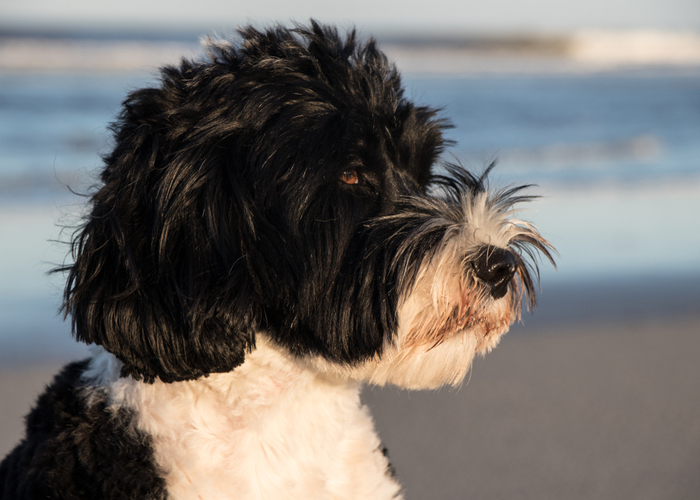
Frequently Asked Questions About the Portuguese Water Dog
How much litter can a Portuguese Water Dog have?
A Portuguese Water Dog can have four to eight litters but in some rare cases, they have reached at least 10 liters in a single birth.
How rare is a Portuguese Water Dog?
During the 1970s, the Portuguese Water Dog was 20 in total all over the world.
When the breed was registered in the American Kennel Club in 1981, the Portuguese Water Dog was named the rarest breed on earth by the Guinness World Records.
During this time, they were only 85 in total around the world. With the help of this breed advocate, they came together to help prevent the extinction of the breed.
Is the Portuguese Water Dog a good family dog?
Yes, Portuguese Water Dogs are amazing family dogs. They are quite affectionate towards their families/ owners but it’s best to have them supervised around children even with training.
Children are energetic and unpredictable while Portuguese Water Dogs are extremely energetic and playful. Mixing this two in the room alone can result in the house being down in just minutes.
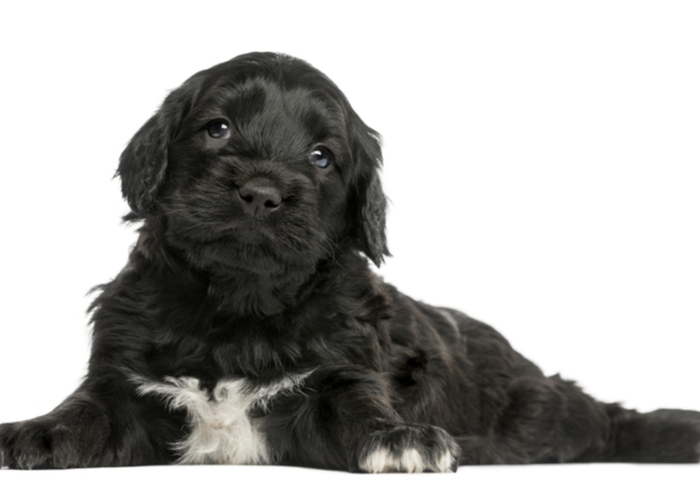
Portuguese Water Dog Breed Profile Summary
As you can see, Portuguese Water Dogs are the best for keeping you on the clock. These fur buddies will keep you accompanied and active.
Portuguese Water Dogs are the best friend you can get. They are a dog breed that is devoted and humorous as well.
If you’re the type to chill at home but also do extensive activities outside, Portuguese Water Dogs are the best company for you.
They can tag along with your outdoor activities whether it’s the land or the beach.
It’s best to meet their requirements to avoid ruckus in your household. After all, doing this much for them is nothing compared to the friendship and companionship they have to offer.
If you’re planning to adopt a Portuguese Water Dog puppy, it’s important to adopt from a reputable breeder.
Portuguese Water Dogs are a relatively healthy breed but if they came from an irresponsible breeder, they can have various genetically inherited diseases.
Sadly, a lot of those have no treatment and the prognosis is quick and low. It’s our responsibility to keep their breed as happy and healthy as possible.
Before adopting, it’s best to research and ask veterinarians about this breed to make sure you as an owner are compatible with the dog.
Portuguese Water Dogs are best in what they do. The least we can do is to be the best for them too.


